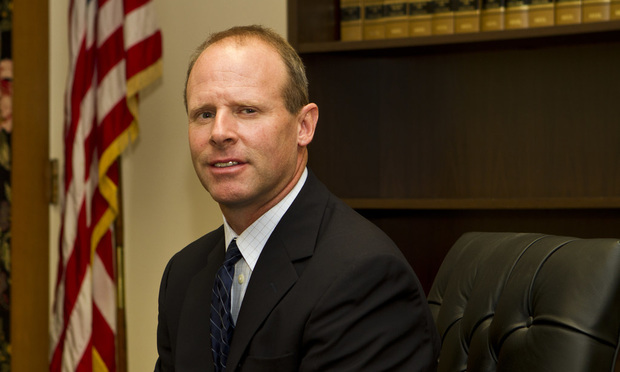Appeals Court Ruling Puts Snapchat Speed Filter Lawsuit Back on Track
The appellate panel revived a suit asserting that Snapchat's speed filter was to blame for the injuries suffered by the victim of a teen driver who was doing more than 100 miles an hour when she wrecked her dad's Mercedes.
June 07, 2018 at 02:21 PM
4 minute read
 The Georgia Court of Appeals revived a personal injury lawsuit against Snapchat, ruling the instant messaging service—whose “speed filter” feature is blamed for causing a serious wreck—is not immune from litigation under the federal Communications Decency Act. Snapchat was sued after a 2015 incident in which an 18-year-old was reportedly using the speed filter to record herself going more than 100 mph in her father's Mercedes when she slammed into another vehicle, severely injuring the driver, Wentworth Maynard. Maynard and his wife sued California-based Snapchat for negligence and loss of consortium in Spalding County State Court. Judge Josh Thacker granted Snapchat's motion to dismiss in 2016, ruling the CDA's protection of online publishers of third-party content immunized it from liability linked to the speed filter, a stylized speedometer superimposed on a picture of the user showing their speed. The speed filter has been cited in other cases in which drivers wrecked or were stopped for speeding. Among its provisions, the CDA states that no provider “of an interactive computer service shall be treated as the publisher or speaker of any information provided by another information content provider.” Thacker ruled that Snapchat was a ”publisher” under the CDA and was not liable for content created by third parties. But Georgia Court of Appeals Judge William Ray II, writing with the concurrence of Presiding Judge Christopher McFadden and Judge Brian Rickman, said Snapchat is not shielded. The CDA's “grant of immunity applies only if the interactive computer service provider is not also an 'information content provider,' which is defined as someone who is 'responsible, in whole or part, for the creation or development of' the offending content,” Ray wrote. Snapchat cited two federal cases in arguing it was shielded. One involved a suit accusing Backpage.com of publishing advertisements linked to sex trafficking, and another sought to hold Yahoo accountable for failing to remove offensive information a woman's ex-boyfriend posted online. In both cases, the service providers were deemed immune because they did not create the offending content. But the Snapchat case is different, wrote Ray, because the Maynards' lawsuit “does not seek to hold Snapchat liable as a speaker or publisher of a third party user's content. Rather, they argue that their complaint seeks to hold Snapchat liable for the negligent creation, design and maintenance of the Speed Filter that encourages excessive speeding, not for the posts themselves.” "Accordingly, we hold that CDA immunity does not apply because there was no third-party user content published," he wrote. The Maynards were represented on appeal by a team of lawyers including, Michael Neff, Darryl Adams and Timothy Peagler of the Law Offices of Michael L. Neff; Michael Terry, Naveen Ramachandrappa and Amanda Bersinger of Bondurant Mixson & Elmore; and Jack Hawkins of Weinberg Wheeler Hudgins Gunn & Dial. In an email, Terry said the “ plaintiffs appreciate the Court of Appeals' carefully reasoned opinion and are glad that Wentworth and Karen Maynard will get their day in court.” Snapchat is represented by Lori Cohen and Janna Nugent of Greenberg Traurig and Benjamin Kleine and Michael Rhodes of Cooley's San Francisco office, who declined to comment.
The Georgia Court of Appeals revived a personal injury lawsuit against Snapchat, ruling the instant messaging service—whose “speed filter” feature is blamed for causing a serious wreck—is not immune from litigation under the federal Communications Decency Act. Snapchat was sued after a 2015 incident in which an 18-year-old was reportedly using the speed filter to record herself going more than 100 mph in her father's Mercedes when she slammed into another vehicle, severely injuring the driver, Wentworth Maynard. Maynard and his wife sued California-based Snapchat for negligence and loss of consortium in Spalding County State Court. Judge Josh Thacker granted Snapchat's motion to dismiss in 2016, ruling the CDA's protection of online publishers of third-party content immunized it from liability linked to the speed filter, a stylized speedometer superimposed on a picture of the user showing their speed. The speed filter has been cited in other cases in which drivers wrecked or were stopped for speeding. Among its provisions, the CDA states that no provider “of an interactive computer service shall be treated as the publisher or speaker of any information provided by another information content provider.” Thacker ruled that Snapchat was a ”publisher” under the CDA and was not liable for content created by third parties. But Georgia Court of Appeals Judge William Ray II, writing with the concurrence of Presiding Judge Christopher McFadden and Judge Brian Rickman, said Snapchat is not shielded. The CDA's “grant of immunity applies only if the interactive computer service provider is not also an 'information content provider,' which is defined as someone who is 'responsible, in whole or part, for the creation or development of' the offending content,” Ray wrote. Snapchat cited two federal cases in arguing it was shielded. One involved a suit accusing Backpage.com of publishing advertisements linked to sex trafficking, and another sought to hold Yahoo accountable for failing to remove offensive information a woman's ex-boyfriend posted online. In both cases, the service providers were deemed immune because they did not create the offending content. But the Snapchat case is different, wrote Ray, because the Maynards' lawsuit “does not seek to hold Snapchat liable as a speaker or publisher of a third party user's content. Rather, they argue that their complaint seeks to hold Snapchat liable for the negligent creation, design and maintenance of the Speed Filter that encourages excessive speeding, not for the posts themselves.” "Accordingly, we hold that CDA immunity does not apply because there was no third-party user content published," he wrote. The Maynards were represented on appeal by a team of lawyers including, Michael Neff, Darryl Adams and Timothy Peagler of the Law Offices of Michael L. Neff; Michael Terry, Naveen Ramachandrappa and Amanda Bersinger of Bondurant Mixson & Elmore; and Jack Hawkins of Weinberg Wheeler Hudgins Gunn & Dial. In an email, Terry said the “ plaintiffs appreciate the Court of Appeals' carefully reasoned opinion and are glad that Wentworth and Karen Maynard will get their day in court.” Snapchat is represented by Lori Cohen and Janna Nugent of Greenberg Traurig and Benjamin Kleine and Michael Rhodes of Cooley's San Francisco office, who declined to comment.This content has been archived. It is available through our partners, LexisNexis® and Bloomberg Law.
To view this content, please continue to their sites.
Not a Lexis Subscriber?
Subscribe Now
Not a Bloomberg Law Subscriber?
Subscribe Now
NOT FOR REPRINT
© 2025 ALM Global, LLC, All Rights Reserved. Request academic re-use from www.copyright.com. All other uses, submit a request to [email protected]. For more information visit Asset & Logo Licensing.
You Might Like
View All
Sanctions Order Over Toyota's Failure to Provide English Translations of Documents Vacated by Appeals Court
4 minute read
Second Circuit Upholds $5M Judgment Against Trump in E. Jean Carroll Case
4 minute read
'Paragraph V Displaced Lathrop': High Court Mulls Sovereign Immunity Waiver Disputes
7 minute read
11th Circuit Revives Project Veritas' Defamation Lawsuit Against CNN
Trending Stories
- 1Cleary Nabs Public Company Advisory Practice Head From Orrick in San Francisco
- 2New York Environmental Legislation in 2024
- 3Cravath Hires Paul Weiss Antitrust Co-Chair
- 4Contract Technology Provider LegalOn Launches AI-powered Playbook Tool
- 5Court of Appeals Provides Comfort to Land Use Litigants Through the Relation Back Doctrine
Who Got The Work
J. Brugh Lower of Gibbons has entered an appearance for industrial equipment supplier Devco Corporation in a pending trademark infringement lawsuit. The suit, accusing the defendant of selling knock-off Graco products, was filed Dec. 18 in New Jersey District Court by Rivkin Radler on behalf of Graco Inc. and Graco Minnesota. The case, assigned to U.S. District Judge Zahid N. Quraishi, is 3:24-cv-11294, Graco Inc. et al v. Devco Corporation.
Who Got The Work
Rebecca Maller-Stein and Kent A. Yalowitz of Arnold & Porter Kaye Scholer have entered their appearances for Hanaco Venture Capital and its executives, Lior Prosor and David Frankel, in a pending securities lawsuit. The action, filed on Dec. 24 in New York Southern District Court by Zell, Aron & Co. on behalf of Goldeneye Advisors, accuses the defendants of negligently and fraudulently managing the plaintiff's $1 million investment. The case, assigned to U.S. District Judge Vernon S. Broderick, is 1:24-cv-09918, Goldeneye Advisors, LLC v. Hanaco Venture Capital, Ltd. et al.
Who Got The Work
Attorneys from A&O Shearman has stepped in as defense counsel for Toronto-Dominion Bank and other defendants in a pending securities class action. The suit, filed Dec. 11 in New York Southern District Court by Bleichmar Fonti & Auld, accuses the defendants of concealing the bank's 'pervasive' deficiencies in regards to its compliance with the Bank Secrecy Act and the quality of its anti-money laundering controls. The case, assigned to U.S. District Judge Arun Subramanian, is 1:24-cv-09445, Gonzalez v. The Toronto-Dominion Bank et al.
Who Got The Work
Crown Castle International, a Pennsylvania company providing shared communications infrastructure, has turned to Luke D. Wolf of Gordon Rees Scully Mansukhani to fend off a pending breach-of-contract lawsuit. The court action, filed Nov. 25 in Michigan Eastern District Court by Hooper Hathaway PC on behalf of The Town Residences LLC, accuses Crown Castle of failing to transfer approximately $30,000 in utility payments from T-Mobile in breach of a roof-top lease and assignment agreement. The case, assigned to U.S. District Judge Susan K. Declercq, is 2:24-cv-13131, The Town Residences LLC v. T-Mobile US, Inc. et al.
Who Got The Work
Wilfred P. Coronato and Daniel M. Schwartz of McCarter & English have stepped in as defense counsel to Electrolux Home Products Inc. in a pending product liability lawsuit. The court action, filed Nov. 26 in New York Eastern District Court by Poulos Lopiccolo PC and Nagel Rice LLP on behalf of David Stern, alleges that the defendant's refrigerators’ drawers and shelving repeatedly break and fall apart within months after purchase. The case, assigned to U.S. District Judge Joan M. Azrack, is 2:24-cv-08204, Stern v. Electrolux Home Products, Inc.
Featured Firms
Law Offices of Gary Martin Hays & Associates, P.C.
(470) 294-1674
Law Offices of Mark E. Salomone
(857) 444-6468
Smith & Hassler
(713) 739-1250






